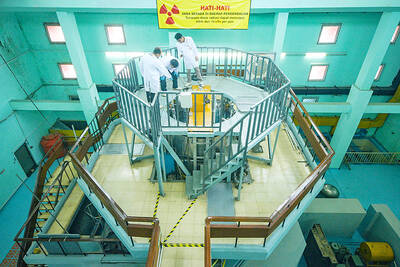Alvaro Colom was to take the oath of office as Guatemala's new president yesterday, promising to crack down on crime and alleviate poverty in one of the poorest and most violent countries in the Americas.
Colom, an engineer turned politician who won Guatemala's presidency in November, has also vowed to help empower the country's ethnic Mayan Indians, telling reporters that he plans "to convert Guatemala into a social-democratic country with a Mayan face."
A good 43 percent of Guatemala's 13 million residents are indigenous Mayas, and they voted overwhelmingly for Colom -- who is one of just three non-Mayas to be a Maya priest and is known as "Sparrow Hawk."
"My government will push equality, cultural diversity and tolerance," Colom, 56, said in an interview on Sunday. "In my Cabinet there will be no racists or male chauvinists. It matters not who governs, but for whom they govern and how this is done."
Colom has already been criticized for naming just one woman and one indigenous person to his 13-member Cabinet, although the key ministries of Interior and Defense remain open.
The new president's center-left proposals have rattled Guatemala's conservative business community. Colom has vowed to end tax breaks for the wealthy, increase the minimum wage, crack down on tax evasion and help strengthen unions.
Colom has also promised to slash poverty levels by 20 percent over his four-year-term by creating 700,000 new jobs, building 200,000 houses and achieving economic growth of at least 6 percent.
Gross domestic product growth is currently at 5 percent. Official figures indicate half the country's 13 million population lives in poverty, though non-governmental organizations put the figure at 80 percent.
Violence had been a key issue in a country where, according to government figures, there are 16 murders a day and five kidnappings a month.
While outgoing President Oscar Berger had a strong pro-US tilt, Colom has said he will strengthen his ties with leftist Latin American governments while maintaining friendly ties with the US.
He cannot turn his back on Washington, as the country's most important source of hard currency are the remittances from the 1.3 million Guatemalans living abroad -- 97 percent of whom live in the US, and 60 percent of whom are undocumented migrants.
Collectively, Guatemalans living abroad sent more than US$4 billion to their homeland last year, according to Central Bank figures.
An industrial engineer by training who has managed dozens of textile companies, Colom served as deputy economy minister in 1991 and later headed an agency that helped people who fought or were displaced in the 1960 to 1996 civil war.
He had made two previous bids for the presidency.
His vice president is Rafael Espada, a prestigious cardiologist who said he will focus on improving the country's ramshackle public health system.
Colom won the presidency in a Nov. 4 runoff vote over retired general Otto Perez Molina. He is the first social democratic president elected since Jacobo Arbenz, toppled in a CIA-organized coup in 1954.
Guatemala is still recovering from a bloody 35-year war with leftist insurgents that ended in a 1996 peace accord.
Guests at yesterday's inauguration were to include Taiwanese President Chen Shui-bian (陳水扁); the heir to the Spanish throne, Felipe de Borbon; and the presidents of El Salvador, Brazil, Mexico, Nicaragua and Panama -- in all 1,500 personalities from 70 countries.

Four people jailed in the landmark Hong Kong national security trial of "47 democrats" accused of conspiracy to commit subversion were freed today after more than four years behind bars, the second group to be released in a month. Among those freed was long-time political and LGBTQ activist Jimmy Sham (岑子杰), who also led one of Hong Kong’s largest pro-democracy groups, the Civil Human Rights Front, which disbanded in 2021. "Let me spend some time with my family," Sham said after arriving at his home in the Kowloon district of Jordan. "I don’t know how to plan ahead because, to me, it feels

Poland is set to hold a presidential runoff election today between two candidates offering starkly different visions for the country’s future. The winner would succeed Polish President Andrzej Duda, a conservative who is finishing his second and final term. The outcome would determine whether Poland embraces a nationalist populist trajectory or pivots more fully toward liberal, pro-European policies. An exit poll by Ipsos would be released when polls close today at 9pm local time, with a margin of error of plus or minus 2 percentage points. Final results are expected tomorrow. Whoever wins can be expected to either help or hinder the

North Korea has detained another official over last week’s failed launch of a warship, which damaged the naval destroyer, state media reported yesterday. Pyongyang announced “a serious accident” at Wednesday last week’s launch ceremony, which crushed sections of the bottom of the new destroyer. North Korean leader Kim Jong-un called the mishap a “criminal act caused by absolute carelessness.” Ri Hyong-son, vice department director of the Munitions Industry Department of the Party Central Committee, was summoned and detained on Sunday, the Korean Central News Agency (KCNA) reported. He was “greatly responsible for the occurrence of the serious accident,” it said. Ri is the fourth person

SKEPTICAL: Given the challenges, which include waste disposal and potential domestic opposition, experts warn that the 2032 nuclear timeline is overambitious Indonesia is hoping going nuclear can help it meet soaring energy demand while taming emissions, but faces serious challenges to its goal of a first small modular reactor by 2032. Its first experiment with nuclear energy dates to February 1965, when then-Indonesian president Sukarno inaugurated a test reactor. Sixty years later, Southeast Asia’s largest economy has three research reactors, but no nuclear power plants for electricity. Abundant reserves of polluting coal have so far met the enormous archipelago’s energy needs, but “nuclear will be necessary to constrain the rise of and eventually reduce emissions,” said Philip Andrews-Speed, a senior research fellow at the